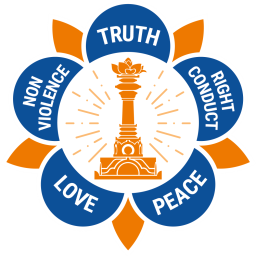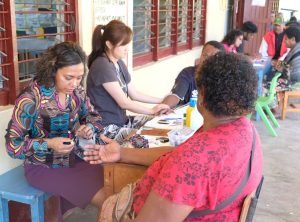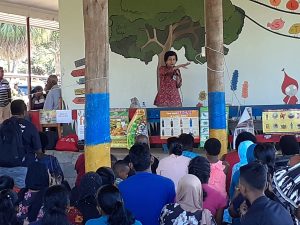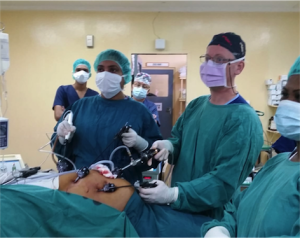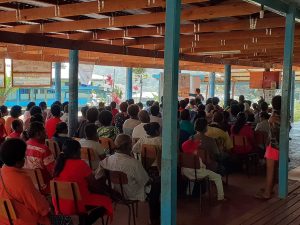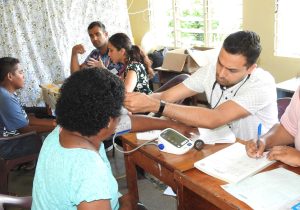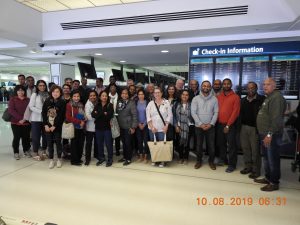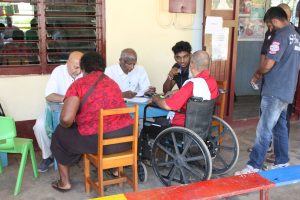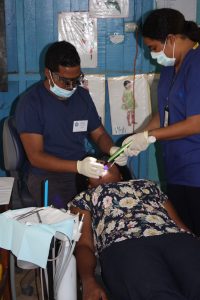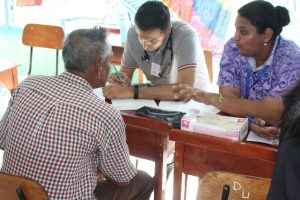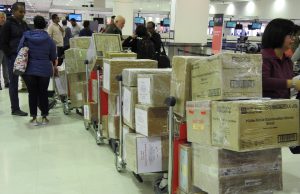The Sai Medical Unit, a unit within the Sri Sathya Sai International Organisation of Australia & PNG (SSSIOA), was established in April 1998. Members of the Unit consist of a wide range of health professionals who provide their services on a voluntary basis in a variety of health-related service activities.
One such activity has been the provision of annual Medical Camps in rural areas of Fiji since 2007. Over the years, the services expanded and, amongst other activity, included advanced medical procedures, and collaborative and professional educational training for students and staff of various hospitals and educational facilities in the islands. The camps have been held in collaboration with the Fijian and of recent years the New Zealand branches of the worldwide Sri Sathya Sai International Organisation and are assisted by medical students from the Uma Prasad School of Medicine (UPSM) of the University of Fiji.
The Sai Medical camps are a major service activity with considerable logistical and administrative complexities dealing with the numbers of professions represented, the services to be provided and the equipment and supplies necessary. Members of the camp teams consist of specialist and general practice doctors, nurses, dentists, Allied Health professionals, and others who volunteer to provide support service during the camps. All the services are provided free of cost to the patients attended to.
The camps are run in consultation with the Fijian Government with a Memorandum of Understanding with the Ministry of Health who identified areas of need which camps attend to. The camps are conducted in various rural communities as well as Labasa Hospital.
The 2007 camp lasted two weeks and was run by 40 medical and allied personnel who volunteered from Australia, New Zealand and the USA. Subsequently, the Sai Medical Unit annually organized and carried out medical camps for a week in July-August, initially in Western Viti Levu then Vanua Levu. The latest major undertaking was in August 2019, the 13th annual camp.
Thirteen camps were run from 2007 to 2019 however, the anticipated 2020-2022 medical camps were disrupted due to the COVID-19 pandemic. During this period the Unit collaborated and organized a series of medical education webinars for students of UPSM and Fiji National University and General Practitioners and hospital doctors. A total of 16 webinars were conducted in 2020, 13 in 2021 and 9 in 2022 were presented by 20 volunteers, consisting of members of SSSIOA and collaborating health professionals from Australia and New Zealand. In October 2022 a combined Australian and New Zealand medical camp was organised under the leadership of New Zealand for a week in rural communities in Viti Levu.
To give some idea of the service that has been conducted over this period, a Neurological Team from Australia visited Fiji for 2 weeks from 2010-2012 and provided specialist medical service at the Colonial War Memorial Hospital, (CWMH) in Suva, Fiji. Eventually a neurosurgeon from Fiji was trained in Canberra and is now based at CWMH. In 2020 a neurosurgery microscope was donated to CWMH. Donations of sophisticated medical equipment as well as other necessary equipment and supplies has been a regular feature of visits. Equipment has often been donated by organisations in Australia supportive of the work being done in Fiji.
The 2019 camp gives a good example of the work undertaken on an annual basis. Twenty-two doctors including many specialists such as, a neurosurgeon, a rheumatologist and a paediatrician, to name just a few specialties represented, as well as 7 GPs, 7 nurses, pharmacists, a physiotherapist, 8 dentists, a dental prosthetist, an endodontist, with 4 medical students and 15 general volunteers attended from Australia. They were supported by a local medical officer and 20 senior students from UPSM.
The camp was conducted in two locations seeing 1018 patients receiving a total of 1775 consultations from the different disciplines. Medicines were dispensed as required. Community health education and screening was also conducted during the patient waiting period.
A surgical unit was established at Labasa Hospital. 11 patients were seen in a clinic and 4 on the wards with 8 operations completed.
The dental team saw a total of 324 patients and provided a total of 508 services including routine dentistry matters such as fillings and extractions as well as denture work. They also had an oral health education program in place.
During the visit, separate medical workshops and a conference on Aged Care were conducted.
The workshop was conducted at Labasa Hospital and covered a range of topics. It was attended by 40 people including 11 final year medical students, 15 Interns, 5 Registrars, 3 General Practitioners and 5 dentists from the hospital
The Aged Care conference was held at the University of Fiji Hall, Saweni Campus, Lautoka for local general practitioners and students. The conference was organised in conjunction with the Sai Medical Units of Australia and Fiji, UPSM and the Fiji College of General Practitioners. The conference was well attended with 20 doctors and medical students from all years.
Representatives of the Fijian government have visited during the camps and expressed their thanks and gratitude for all the work that has been undertaken by the SSSIO Medical Units. Apart from the gratitude of those assisted by the medical camps, those who volunteered have also been grateful for the opportunity to provide the service. Many found it very rewarding, not only in experiencing another culture and being able to make a difference, but perhaps more important, a heart-to-heart experience both with the patients and with all those fellow volunteers.
The Medical Unit has been active in Australia over the COVID Pandemic period conducting several webinars and seminars on community health issues in Australia as well as collaborating with the New Zealand Sai Medical Unit in providing service to Fiji. Their inspiration arises from the example of the SSSIO’s founder, Sri Sathya Sai Baba who promoted free health care for all, especially those who don’t have the means to afford commercial health services. His own health care service includes several hospitals, 2 of which are world standard, state-of-the art super-specialty hospitals, as well travelling health care services, all of which charge no fees for service rendered.
Views: 8
